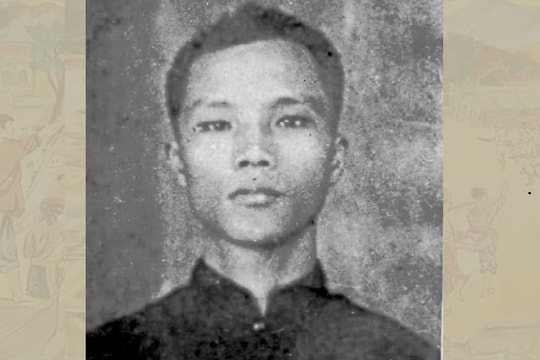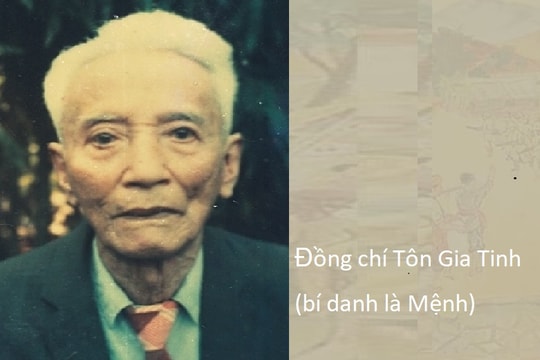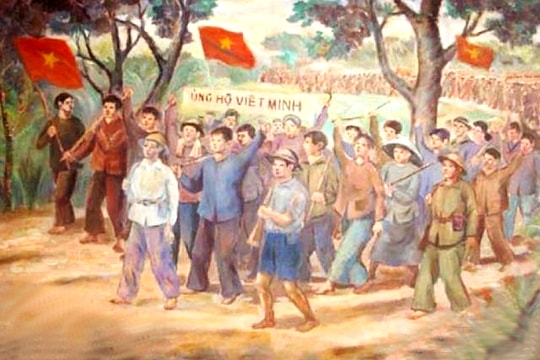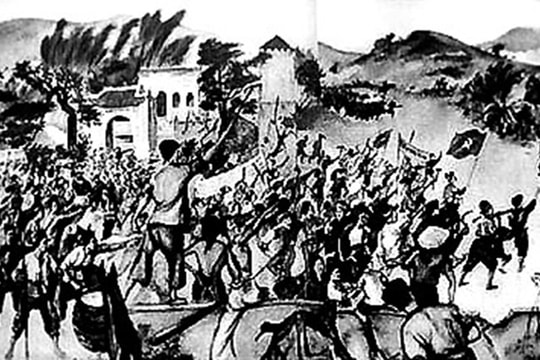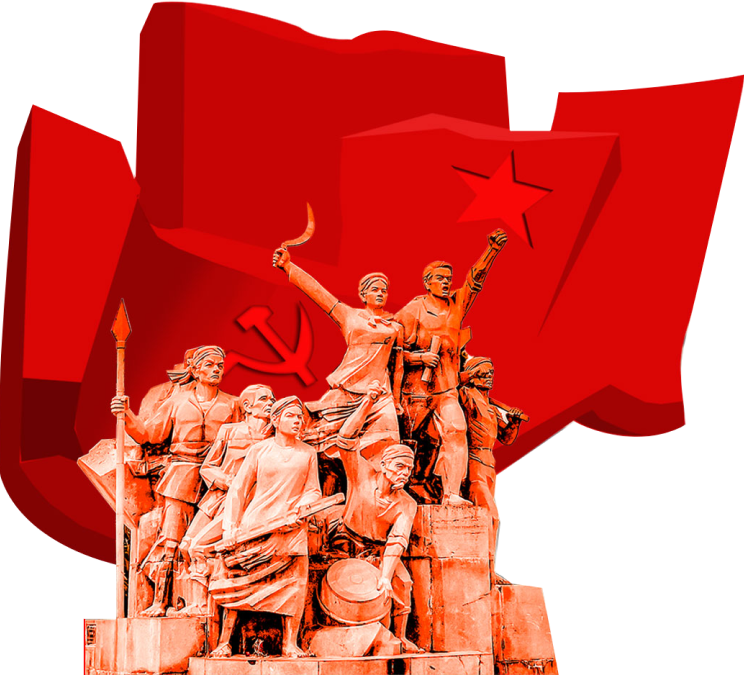Comrade Ho Hao (1911-1941): A brave communist soldier, determined for the revolutionary ideal.
Ho Hao was born and raised in a fertile land located along Highway 8 (Vinh - Napê), formerly called Huu Bang village, Huu Bang commune, now Son Bang commune, Huong Son district, Ha Tinh province. This place, since ancient times, has been famous not only for its beautiful landscape but also for its tradition of learning. This was also an important area of Phan Dinh Phung's army in the Can Vuong movement against the French.
Ho Hao's father died when he was less than 3 years old. His mother, Mrs. Tran Thi Thai, was a very capable and upright person. In addition to diligently taking care of the fields and gardening, and raising 5 children, she had to fight against the oppressive authorities many times to maintain her family's life. Once, she went to the village temple to demand the return of the tax money that the local mandarins had fraudulently collected. Even with the Westerners, she was not afraid.
When Phan Dinh Phung built a base in the Vu Quang mountain area, along with the people of Huong Khe and Huong Son, her family actively helped the insurgents. Then, in the years 1904-1905, she was one of the people who enthusiastically supported money for the Dong Du movement.
Ho Hao was the fifth child in the family. He was raised, cared for and educated by his mother. At the age of 14, Ho Hao entered the French-Vietnamese school in Huong Son district. He was an enthusiastic, intelligent and self-respecting student. He was very dissatisfied with the unfairness in the school. He hated the arrogant attitudes, the rude gestures, and the insults to the students' personalities from teachers who were always flattering and praising the merits of "Great Law".
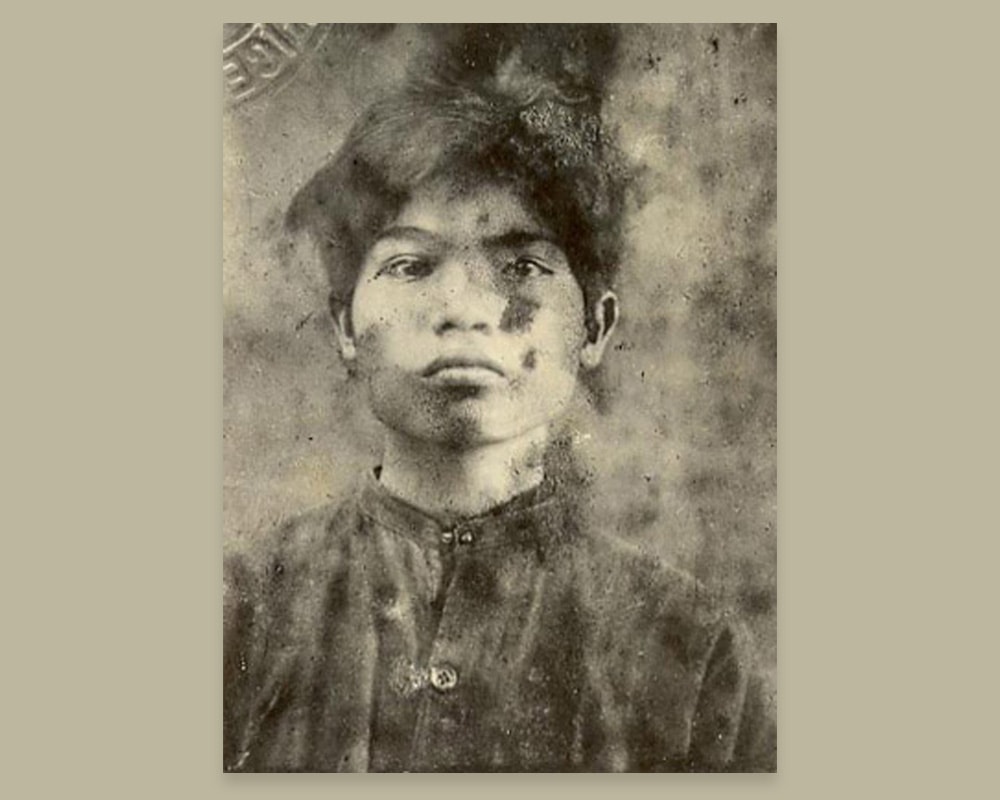
Since the activities of the Phuc Viet Association, progressive books and newspapers began to be secretly distributed in the school. Each column of newspaper, each page of book containing new content had a strange attraction for active students who loved to learn new things like Ho Hao. Many days, Ho Hao sat on the bank of the Pho River reading books, forgetting about lunch.
Those books and newspapers followed him even into class. One day, the director saw a banned book in Ho Hao's desk. He confiscated the book and hit him with a ruler. Ho Hao stood up, snatched the ruler, placed it on the desk, and calmly walked out. In 1929, Ho Hao was expelled from school by the director for "regularly possessing banned books and having unruly and rebellious behaviors."
Unable to study at the district school, Ho Hao asked his uncle to enroll him in the Tong school in Pho Chau. Here, he met teacher Nguyen My Tai, an active member of the Phuc Viet Association in Huong Son. With teacher Tai's guidance, patriotic and revolutionary poetry, and the help and nurturing of Phuc Viet members in the school, Ho Hao's dream had more conditions to fly high. He actively participated in seminars on the current situation of the Sinh Doan organization. Day and night, Ho Hao devoted all his efforts to building and strengthening the Sinh Doan organization and finding suitable forms of activities for this organization.
On February 3, 1930, the Communist Party of Vietnam was born. Shortly after, the Huong Son District Party Committee was established. Assigned by the Party cell, Ho Hao transformed the Sinh Doan organization of the Tan Viet Party into the Sinh Hoi organization of the Communist Party of Vietnam.
From then on, Ho Hao threw himself into the bustling and urgent activities of students with the Student Association as the core. He actively participated in organizing speeches and propaganda sessions about communism and the Party's policies. During the celebration of International Labor Day on May 1, 1930 in Huong Son, Ho Hao was one of the organizers and leaders of the flag-raising and leaflet-distribution. After going through such challenging activities, Ho Hao came to the Party. One night in early May 1930, the Party members of Pho Chau Primary School met under a royal poinciana tree of the school, welcoming Ho Hao into their ranks. In that sacred moment, Ho Hao stood before the Party flag, swore to sacrifice his whole life and strive for the communist ideal.
While the student movement was growing strongly, while Ho Hao was living vibrant and beautiful days, the school entered the summer vacation. According to the Party's policy, he was introduced to activities at the Huu Bang Party Cell.
At this time, throughout the country, especially in Nghe Tinh, the revolutionary movement was rising strongly. In harmony with the struggle of workers in Vinh-Ben Thuy and farmers in Thanh Chuong, Nam Dan, Can Loc districts... Huong Son Party Committee also advocated mobilizing the masses to fight. With the enthusiasm of youth, Ho Hao worked day and night in hamlets and villages to propagate and mobilize people to join revolutionary mass organizations, preparing to stand up and fight against feudalism and imperialism. The burning revolutionary spirit in that young party member had the power to deeply influence everyone.
On September 17, 1930, Ho Hao attended the conference of Huong Son District Party Committee, discussing the mobilization of the masses to demonstrate and expose the Southern Dynasty officials who had many blood debts with the people. At this conference, he was elected to the Command Committee of the struggle.
On September 19, 1930, on all the roads, groups of people poured out onto Highway 8, forming a mass and heading towards the gathering place. As the commander, Ho Hao was like a shuttle, sometimes at the head, sometimes in the middle, sometimes at the end of the group, both organizing the ranks and encouraging the masses. With the strong encouragement of Ho Hao and other commanders, the revolutionary masses rushed like a rising tide to destroy the house of a traitor in Huong Son, despite the obstruction of the coolies and threatening planes.
After the victory of this campaign, the District Party Committee advocated mobilizing the masses to continue protesting straight to the district office to demand tax reduction and exemption. To protect the revolutionary masses, on the evening of September 21, 1930, Ho Hao commanded the self-defense force to go to Cau Nam area to cut the telegraph wires, preventing the enemy from communicating with each other, and erecting obstacles to prevent soldiers from coming from everywhere to suppress the protest.
At dawn on September 22, 1930, more than 2,000 people, armed with sticks and spears, marched straight into Huong Son district office. The Huong Son district chief mobilized all the soldiers of Pho Chau station to suppress the demonstration. He ordered the soldiers to open fire on the protesters, killing and injuring many people. Despite the bloody suppression of the enemy, Ho Hao rushed to the most difficult and dangerous places. Although he directly commanded the militia to fight against the soldiers, he did not forget to arrange forces to carry the wounded back for treatment or bring the bodies of those who had sacrificed back to their hometowns for burial. In the days after this struggle, Ho Hao visited and encouraged the families of the victims and, together with other comrades, found ways to stabilize and maintain the morale of the masses.
Faced with the sudden attacks of the revolutionary masses, the imperialists and feudalists of the Southern Dynasty in Huong Son were extremely panicked. They tried their best to hunt down the movement's leaders. In early October 1930, Ho Hao was arrested.
That day, the enemy brought Ho Hao to Ha Tinh prison. There were already all the notorious evil spies with all kinds of torture instruments ready to “welcome” Ho Hao - a dangerous communist student in Huong Son. The executioners thought they would be able to subdue Ho Hao, but they were wrong. After the beatings that shredded Ho Hao’s flesh, the spies asked:
- Why did you join the Party?
- I joined the Party to overthrow the current regime, regain independence for Indochina, and build the Soviet regime! - Ho Hao answered clearly and decisively.
Knowing that it could not shake Ho Hao's iron will, the Southern court of Ha Tinh sentenced him to life in prison and exiled him to Lao Bao.
Arriving in Lao Bao, Ho Hao joined the prison party cell and immediately embarked on a new fight. He was one of the organizers, leaders and active participants in the struggles of his fellow prisoners.
Those struggles were all brutally suppressed by the enemy. Those suspected of being leaders were imprisoned separately and brutally beaten. Ho Hao was imprisoned in a dark cell and tortured for many days and nights. The fierce struggles in prison were not always successful, but they strengthened the revolutionary will of the communist prisoners and forced the enemy to fulfill some of the prisoners' demands.
At the end of 1935, Nguyen Huu Bai, Minister of Personnel of the Southern Dynasty government, who had stained the blood of cadres, party members and the masses of Nghe Tinh in the years 1930-1931, made a scene by visiting Lao Bao prison. The day he gathered the prisoners to "appease them", Ho Hao could not contain his anger, stood up and said sarcastically:
- Dear "big man" of the Southern Dynasty! The Lao Bao political prisoners have received a lot of gratitude from "big man". Tomorrow, let's go back to Hue to thank "big man"!
Hearing Ho Hao's words, the prisoners felt satisfied, but Nguyen Huu Bai had to swallow his anger and ignore it.
On July 14, 1936, under pressure from the strong struggle movement of the French people, the French Popular Front Government was forced to release a number of political prisoners in Indochina. Ho Hao was returned to his hometown on this occasion.
Ho Hao returned to his hometown at a time when the Democratic Front movement was developing quite vigorously. In order to have the opportunity to establish contact with the Party, he disguised himself as a raft and buffalo trader. With this job, he could contact his old comrades. One evening in October 1937, Ho Hao met a friend near the Trang market ferry on the way from Huong Son to Vinh. Through this friend, he learned about the revolutionary activities in Vinh - Ben Thuy city and surrounding districts, and learned about the struggle of Truong Thi workers that was resounding throughout the country. Sympathizing with the difficulties of workers' lives in the final stage of the struggle, Ho Hao asked this friend to transfer all the money he brought with him to support the striking workers.
In June 1938, Ho Hao met a comrade in the Nghe An Provincial Party Committee. During a conversation on his wooden raft moored under Cua Tien Bridge (Vinh), this comrade informed Ho Hao of some new policies of the Party. Ho Hao was very happy to meet the Party. After the conversation, he handed over the wooden raft to his followers and boarded the train to Huong Son that same night.
Ho Hao went back to villages and plantations to mobilize farmers and workers to re-establish guilds. Under his guidance, some places organized lawsuits against village chiefs for occupying public land and embezzling village funds.
Through these activities, Ho Hao selected active people and established party cells. On that basis, in early 1940, the Huong Son provisional district committee was restored with him as secretary.
He used his house as the headquarters of the district party committee. He not only took care of all the accommodation and food for the cadres but also paid for typewriters and other equipment to reprint Party directives and documents and disseminate them to the party cells.
On the other hand, implementing the policy of the Regional Party Committee, along with organizing and mobilizing the working masses, Ho Hao sent cadres to the stations in Pho Chau, Cho Bong, and Nape (Laos) to propagate and mobilize soldiers.
In September 1939, World War II broke out. The French colonialists and their henchmen focused on suppressing the revolutionary movement in Indochina. Most of the party members who were active in the democratic movement were arrested. Thanks to his previous experience, Ho Hao avoided the enemy's pursuit.
After this terror attack, in May 1940, Ho Hao secretly went to Vinh to contact the Nghe An Party Committee. Here, he met an officer of the Central Region Party Committee. Under the guidance of the Party Committee, in July 1940, Ho Hao returned to Huong Son to gather the remaining district Party Committee officers to discuss plans to implement the Party's new policies. The conference decided to launch a propaganda campaign about the new situation and tasks, mobilizing the masses to expose the tricks of the French and Japanese.
To build forces to prepare for armed violence when conditions permit, the conference emphasized that "special attention must be paid to "patrol" organizations so that they can be transformed into Party self-defense teams, selecting the most active and self-sacrificing elements among them into guerrilla teams" (Provisional Plan of Huong Son District Party Committee, Nghe Tinh Provincial Party Committee's LSĐ Research Board).
After the conference, Ho Hao carried out all work at a very urgent pace. He focused his efforts on directing the Party cells to implement the policies set out by the conference. However, due to the betrayal of a degenerate element in the district office, on December 9, 1940, Ho Hao was captured by the enemy on his way to work.
As a key cadre, who had devoted his entire life to the movement of his district, being arrested in the midst of a boiling revolutionary situation, Ho Hao was extremely anxious and impatient. During his detention at Pho Chau prison, he tried every way to contact his comrades outside, persuading his fellow soldiers to create an opportunity to quickly escape from prison and return to his compatriots and comrades. On the night of March 11 and the morning of March 12, 1941, with the help of a soldier who had become enlightened about the revolution, Ho Hao escaped from Pho Chau prison and continued to take on the role of revolutionary leader in Huong Son.
One month after Ho Hao escaped from prison, the Song Con Party Committee was restored and led the workers in the struggle to demand that the plantation owners abolish the extra rent and forest rent and increase wages. Next, the provisional District Party Committee was restored and contacted the Nghe An Provincial Party Committee and the Central Region Party Committee.
Imbued with the Regional Party Committee's policy of seizing the opportunity for uprising, encouraged and urged by the Bac Son and Nam Ky uprisings, especially the Rang mutiny (Do Luong), on April 22, 1941, the Huong Son District Party Committee met to discuss the action plan. The conference decided to coordinate with the Thanh Chuong District Party Committee to capture Pho Chau station, free a number of leaders of the District Party Committee who were being detained, collect weapons and then withdraw to the upper district, rely on the Song Con and Voi Bo plantations to build bases, prepare forces so that when conditions were right, there would be an armed uprising to seize power in the two districts of Huong Son and Thanh Chuong. The conference decided to take the guns and ammunition of the Song Con plantation owner Gioc-gieu Phe-ray to carry out the above important policy.
On May 5, 1941, Ho Hao sent an officer to meet the Regional Party Committee to ask for opinions on this issue, but the Regional Party Committee did not accept it.
On May 13, the District Party Committee met again, affirming its determination to implement the above policy. That same night, comrade Ho Hao personally went to meet the Regional Party Committee to persuade the Regional Party Committee to allow the implementation of the earnest wish of the comrades in the Huong Son provisional district party committee. Meanwhile, unable to contain their revolutionary enthusiasm, seeing a favorable opportunity, the comrades at home decided to take action. On May 14, 1941, Phe-ray was killed. All weapons, including 14 guns and 700 bullets of various types, were confiscated by the revolutionary army. The next day, the comrades continued to punish the gang leader Ho Dung Tai, when he was ordered by the Huong Son district chief to search around the Song Con plantation area.
The above shocking news shook the colonial and feudal apparatus in Huong Son and in the two provinces of Nghe An and Ha Tinh. In August 1941, the Resident General of Central Vietnam, Minister of Justice of the Bao Dai government, went to Vinh to meet with the envoy, governor, and chief of the secret police of the two provinces of Nghe An and Ha Tinh to discuss a response plan. They determined that "the Ho Hao movement is a link in the chain of a large movement launched by the Communist Party to overthrow the current French regime in Indochina" (Report of the Central Vietnam Secret Police Department dated December 22, 1941 to the Governor-General's Palace). Immediately after that, a wanted notice with a photo of Ho Hao was posted everywhere in Nghe Tinh: "Whoever reports and captures Ho Hao will be rewarded 1,000 dong, whoever captures his accomplices will be rewarded 100 dong". Being hunted down and realizing that he could not operate, Ho Hao and some other comrades decided to take all the captured weapons and temporarily hide in Laos, waiting for an opportunity to return to operate.
On December 14, 1941, with the intention of finding contact with the Nghe An Provincial Party Committee and the Central Region Party Committee, Ho Hao returned from Sop Tong village near the Vietnam - Laos border to Thanh Chuong. He entered the camp of Nguyen Duong Ba, a former prisoner from Vo Liet commune. Discovering this, Om-be - the Chief of Central Vietnam's Secret Service, along with the chief of Rang market station, brought soldiers to threaten and entice Nguyen Duong Ba to carry out their sinister plan. Subdued by the enemy's threats, Ba betrayed. At 6:10 p.m. on December 16, 1941, Ho Hao fell into an ambush and was shot dead.
The cowardly enemy brought Ho Hao’s body back to Huong Son and dragged it along all the main roads in the district. Afterwards, they propped up his mangled body in front of the Song Con plantation, holding two swords across his neck. They forced Ho Hao’s family to perform “fasting” and worship Phe-ray for three days and nights… The enemy thought they could intimidate the fighting spirit of the masses. However, their barbaric face was increasingly exposed. The call for revenge for comrade Ho Hao urged every party member and mass of Huong Son.
Years have passed, but the image of Ho Hao, a communist soldier who was resolute in leadership, enthusiastic and bold in action, and bravely and aggressively involved in all Party movements, always lives forever in the memory of the Party Committee and people of Huong Son, Nghe Tinh.

